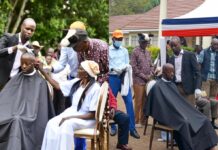The Kenya Wildlife Service (KWS) received a donation of five Land Cruisers from WildLandscapes International and Re:wild through the support of Tsavo Trust in a significant boost to the fight against poaching and protection of endangered species.
The vehicles will strengthen ranger patrols, enhance mobility across rugged terrains, and improve intelligence-led conservation operations, officials said.
Speaking during the official handover at KWS Headquarters, the Chairman of the KWS Board of Trustees, Lt. General (Rtd) Walter Raria Koipaton said the donation was a symbol of shared responsibility in protecting Kenya’s natural heritage.
“This launch symboli z es what is possible when partnerships are anchored on trust, shared values, and colle ctive responsibility,” said Koipaton.
“Kenya’s wildlife heritage is a national treasure and a global asset, and its protection requires joint effort by governments, conservation organizations, communities, and individuals.”
KWS Director General, Prof. Erastus Kanga, welcomed the support, noting that it comes at a time when the service is transforming its operational capacity.
“When I first took office, one of our biggest challenges was the acute shortage of operational vehicles — rangers often had to patrol vast areas on foot,” said Prof. Kanga. “Two years down the line, however, we have turned a corner. Through internally generated revenue and the support of partners, we have acquired over 90 brand-new Land Cruisers. Slowly but surely, we are building a stronger, more mobile KWS — one that can meet the demands of modern conservation.”
“For our rangers, these vehicles mean quicker patrols in the rugged terrains of Tsavo, faster response to threats, and better protection for our rhinos, elephants, and other endangered species. For the Kenyan people, they mean stronger tourism, healthier ecosystems, and sustainable livelihoods,” he said.
The donations will primarily support Tsavo Conservation Area, home to one of the last great strongholds of black rhinos and elephants. They directly align with the KWS Strategic Plan2024–2028, which prioritizes wildlife security, use of modern technologies, and expanded monitoring of endangered species.
The initiative also supports the Government of Kenya’s Bottom-Up Economic Transformation Agenda (BETA), which recognizes conservation as both a biodiversity safeguard and a driver of sustainable tourism, jobs, and community livelihoods.
Both leaders praised the role of partners — including WildLandscapes International, Re:wild, and Tsavo Trust — as well as the dedication of KWS staff and rangers on the frontlines.
CEO and Founder of WildLandscapes International David Houghton commended KWS’s leadership and commitment:
“It is a n honor for WildLandscapes to collaborate with the Kenya Wildlife Service in Tsavo, a park of exceptional importance for Africa’s wildlife. We have the utmost respect for Director General Kanga and his management team, whose dedication and expertise are truly commendable. KWS is setting an example not just for Africa but for the world. In South Africa, a rhino is poached almost every day — yet here in Kenya, populations are being safeguarded and given hope. That is an extraordinary achievement, and I congratulate Prof. Kanga and the entire KWS team.”
KWS reaffirmed its commitment to transparency and accountability in managing the donated assets to safeguard Kenya’s wildlife for generations to come.



















